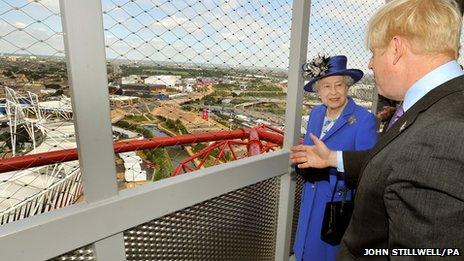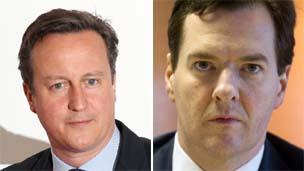Is there an Olympic Games bounce for Boris?
- Published

Boris Johnson accompanied the Queen on a tour of the Olympic Park on Saturday
The high profile afforded Boris Johnson during the London Olympics has already encouraged a fresh wave of speculation about his future political ambitions, and chances.
Journalists have moved to fill the space at the front end of their publications with more talk of him leading his party and, perhaps, one day the country.
A survey of Tory members by the ConservativeHome website is the latest indication that the popularity of Chancellor George Osborne - previously held to be the favourite to succeed David Cameron - has fallen sharply.
It suggests 32% favour London's mayor to succeed Mr Cameron, ahead of William Hague (24%) and Michael Gove (19%). Mr Osborne scores just two per cent.
Commentators seem agreed that the exact route of the journey is far from mapped out, but Mr Johnson is pointed very much in the right direction.
ConservativeHome editor Tim Montgomerie believes Mr Johnson has a winning combination of authentic Conservatism and an ease with modern Britain which still eludes many senior party figures.
He writes: "Boris zoinks off the Geiger counter of positivity. He hugs the nation and smothers it with rhetorical kisses."
The early signs are that Mr Johnson has indeed stepped effortlessly onto the Olympic podium, presented with an opportunity to flash his credentials to the rest of the country, and beyond.
'Political devilry'
Rafael Behr, political editor of the New Statesman, says it is clear Mr Johnson intends the Olympics to be a "festival of self-promotion", and it will mark the beginning of a dangerous period for his government rivals.
Behr writes: "He has told aides he intends to perform his mayoral duties on an unofficial part-time basis after the Olympics.

George Osborne has previously been thought to be David Cameron's natural successor
"That leaves Johnson with more than three years of idleness on his hands, which from Downing Street's point of view means endless scope for political devilry."
City Hall denies the mayor has ever said this, and says that the claim is untrue and that Mr Johnson will be dedicating all his energies to the job.
Mr Johnson secured himself a prime gig at the conclusion of the torch relay, whipping up thousands of concert-goers in Hyde Park with what is becoming a trade-mark rhetorical style: "We are going to get more medals than the French, aren't we?!"
It was a performance few other political figures would dare attempt, let alone pull off.
He has branded the office of mayor across a number of festive Olympic arts and cultural events, much of the money for which has come from the Arts Council, Olympics organisers Locog or the National Lottery.
A new "Mayor of London presents" website - carrying much the same information as Locog's own 2012 Festival site - is at the centre of a City Hall campaign costing at least £1m.
The money for many of the free events in London comes from the pot to which Londoners have been contributing a £20 annual Olympic precept on their council tax bills for the last six years. They will continue to pay it for several more years to come.
Cabinet ministers may be watching on with envy as London's mayor gets the gain without the pain.
Barring a calamitous failure of policing or on the transport network, problems are unlikely to be left at his door.
Transforming east London
As he joked with the Queen on a trip up the Orbit tower, it was Lord Coe, British Olympic Association chief Colin Moynihan and Sports Minister Hugh Robertson fielding the rough stuff about empty seats.
The Treasury may fret about the latest negative Gross Domestic Product (GDP) figures, but Mr Johnson gazes across an already transformed east London landscape and speaks of the many thousands enjoying a trip on the capital's new cable car.
Which brings us round, of course, to what he does in, and for, the capital in the long weeks and months after the London 2012 bunting has been folded away.
Gifted tens of millions of pounds in one-off extra investment to get him through May's election, he has got the hard work ahead with the money dried up.
How will he fare in helping to create jobs, build enough affordable homes and keep transport and policing fit for a global city?
Studies show few previous holders of the Olympic Games reaped significant economic rewards.
Once the guests have left the mayor - the party-holder-in-chief - will be left pondering the cost of the entertainment and wondering how to deal with the dry rot while the mortgage still has to be paid.
If, as a saying goes, there is an opportunity in every crisis, then it is also true that after every party there is usually a hangover.
- Published28 July 2012
- Published27 July 2012